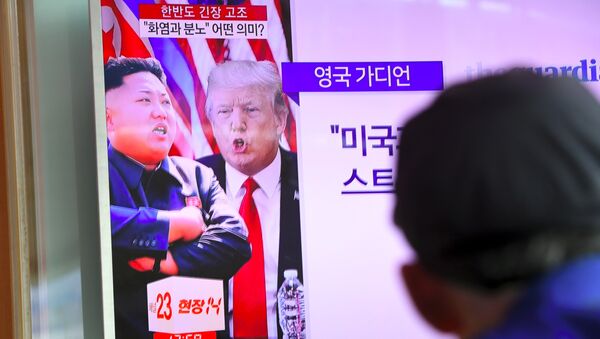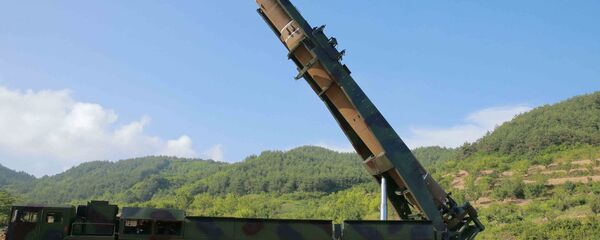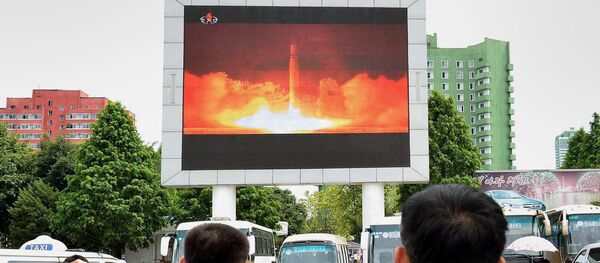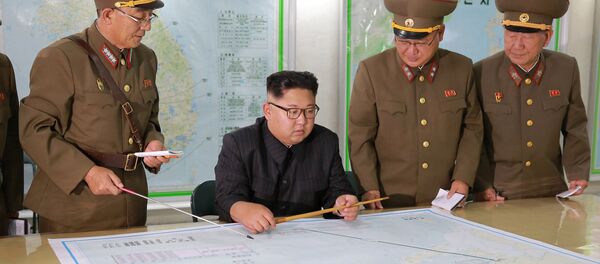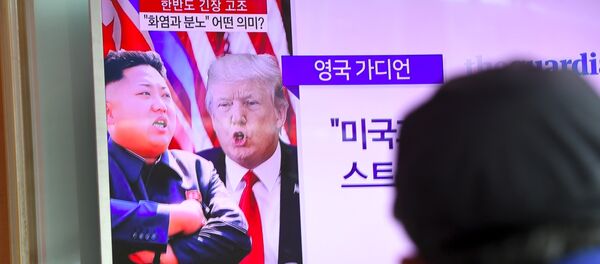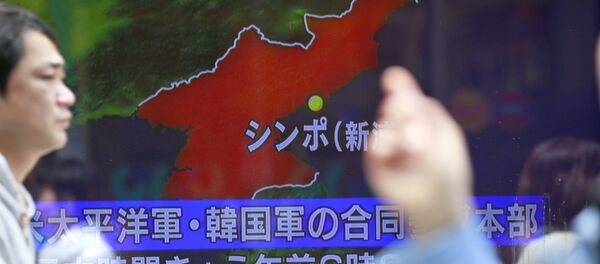MOSCOW (Sputnik) — The short period of calm in the relations between North Korea and the United States, which has recently gone through an especially turbulent period, is not likely to last long, but concessions on both sides could help restart negotiations, experts told Sputnik.
Tensions flared up between the United States and North Korea following the United Nations Security Council adopting new sanctions on Pyongyang in early August. In the aftermath, Washington and Pyongyang exchanged heated warnings with US President Donald Trump promising to meet any North Korean threats with "fire and fury" and North Korea saying it was seriously considering a strike near the US territory of Guam in the Western Pacific.
CALM BEFORE STORM
Earlier this week, North Korean leader Kim Jong Un reportedly decided to hold off the strike in the vicinity of Guam, which Trump praised on Twitter as "a very wise and well-reasoned decision."
"Those of us who have been watching Korea for a long time know that it won’t last very long. We have grown accustomed to seeing tension ratchet up, with threats of turning Seoul into a sea of fire and of lobbing missiles at the White House, alternate with periods of quiet from Pyongyang," Baker said.
According to the expert, this could be called "calm before an upcoming storm," but the calm-storm cycle is likely to keep repeating itself in the future.
Doctor Margaret Kosal, an associate professor in the Sam Nunn School of International Affairs at Georgia Institute of Technology, agreed that the situation appeared quite typical to those who had long studied North Korea.
"They pursue a provocative action with a dramatic show of escalatory rhetoric, and then they back down. It’s a well-established pattern," Kosal told Sputnik.
The expert stressed that Pyongyang's actions should not be discarded despite the repetitive nature, "because of the potential implications for millions of people living in the region if there is a miscalculation."
"Rhetorical tensions are not increasing at this time. There are risks associated with US-ROK [South Korea] exercises but North Korea's delay of its Guam missile demonstration plans helps to ease tensions," Scott Snyder, a senior fellow for Korea studies and director of the program on US-Korea policy at the Council on Foreign Relations think tank, told Sputnik.
According to Doctor Srinivasan Sitaraman, an associate professor at Department of Political Science at Clark University, the reduction in tensions was noticeable and Pyongyang's decision to delay the strike aimed near Guam was an important contributing factor in establishing the time-out.
"However, the fundamental issues between the United States and North Korea have not been resolved. Resolving them would require patient diplomacy and critical involvement of South Korea, Japan, China, and Russia," Sitaraman added.
DOUBLE FREEZE PROSPECTS
In March, China proposed a so-called double freeze plan, which stipulates simultaneous cessation of North Korea's nuclear activity and US-South Korean military exercises. The initiative has been supported by Russia but has not been welcomed by the United States.
"The double freeze proposal is a good one, but I doubt the US will accept it. However, I believe that the US might offer a scaling down of the size of its military exercises in return for a North Korean freeze on further development of ICBMs [intercontinental ballistic missiles] and nuclear bombs," Baker said.
Ramana said that the "double freeze" seemed like a good first step in solving the problem.
"In terms of solving the problem, I do see the 'double freeze' or a 'freeze for a freeze' to be a step in the right direction. I think it embodies an important element that should be part of any solution, namely reciprocity," the expert said.
"Pursuing a double-freeze, followed by talks, easing of sanctions, and assurances that the West, particularly the United States will not militarily attack North Korea would be a good place to start the negotiations involving the Six Parties (South and North Korea, USA, Japan, Russia, and China) towards a more permanent and long-term solution to addressing the North Korean nuclear and missile crisis," the expert said.
Snyder was less optimistic about the double suspension proposed by China.
"I do not see the double-freeze proposal as an effective starting point for denuclearization talks. Both sides should establish a dialogue channel to minimize risks of miscalculation," the expert said.
Kosal also said that "double freeze" proposal would not be very popular with the countries involved in solving the crisis, "for a variety of reasons including the fact that it’s something of a false equivalence."
The expert pointed out that Pyongyang's missile tests violated UN resolutions, while US-South Korean joint military exercises were legal.
LONG-TERM GOALS
"All parties need to return to diplomatic discussions on a path forward. It's good that China and the US are communicating. It is good that they are communicating with the White House, the State Department, and the US ambassador to the UN," the expert said.
According to Baker, informal talks between the representative of North Korea and US officials could be currently taking place in New York. The expert said he hoped that Washington would offer to stop flying its bombers toward North Korean borders in exchange for Pyongyang agreeing not to send its missiles to the area near Guam at the informal talks.
"In the long term, I would like the United States to drop its insistence on a North Korean commitment to destroy its small stockpile of nuclear weapons before formal talks between the US and the DPRK can begin. Instead, I would like to see the US offer negotiations for a peace treaty that would finally end the Korean War," Baker said.
Ramana stressed that a viable solution should include "full respect for the sovereignty and territorial integrity of North Korea and good faith diplomatic dialogue with the regime."
According to the expert, the United States should stop joint military exercises in the region, withdraw Terminal High Altitude Area Defense (THAAD) system, currently deployed in South Korea, as two possible short-term measures. Ramana added that the United States and other states in possession of nuclear weapons should eliminate their arsenals as soon as possible.
Sitaraman pointed out that Pyongyang's fundamental desire was to ensure that the current government would not be toppled and its internal policies would not be influenced. The expert specified that he did not see a military solution to the problem, adding that it was necessary to hold talks with North Korea and build trust, while making it clear that North Korea's provocations would not always be tolerated.

